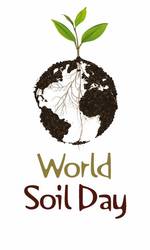
Soil biodiversity is key to ensure food security, said FAO Representative for Sri Lanka and the Maldives, Dr Xuebing Sun issuing a statement on 05 December 2020 World Soil Day.
“Soil is an ecological system and it is a finite resource, meaning its loss and degradation is not recoverable within a human lifespan. Conservation of soil biodiversity and soil organic carbon through sustainable farming practices is essential to improve soil health and agricultural productivity,” said Dr Xuebing Sun.
Dr Sun reiterated that fighting loss of soil biodiversity is significant to global food security and the achievement of more than half of the Sustainable Development Goals. Soil biodiversity plays a vital role in the soil ecosystem as soil organisms are responsible for nutrient cycling, regulating the dynamics of soil organic matters, soil carbon sequestration and greenhouse gas emissions, and allowing soils to function properly.
Soil biodiversity plays a central role in preserving human health through a range of pathways including water purification, climate stabilization, and nutrient and food security. Plants surrounded by bio diverse soils also have a greater resilience against pests and diseases, he said.
“The strong collaboration between stakeholders in the agriculture sector towards conserving natural resources sends a clear signal. In the past 50 years, advances in agricultural technology led to a quantum leap in food production and bolstered food security. However, this intensive crop production has depleted the soil, jeopardizing our ability to maintain production in the future. To feed a growing population, it is important now, more than ever, to ensurethat farming is done in an environmentally friendly manner, where not just livelihoods but our natural resources are placed in the centre” he emphasized
.

